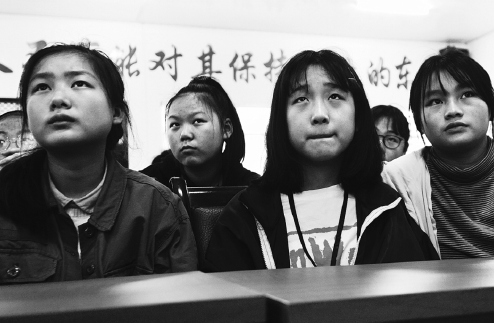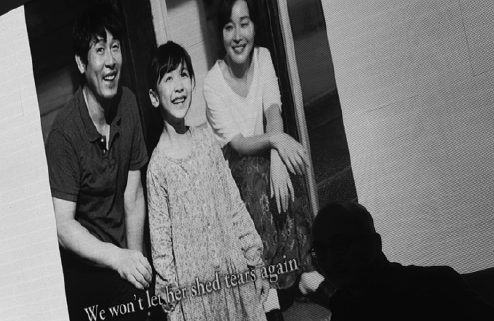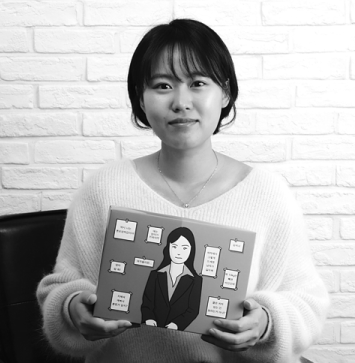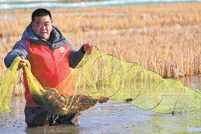Progress made in war on child sex abuse
Social groups and rights advocates step up efforts to combat attacks

Imagine you're a female student traveling to school on an overcrowded bus. Suddenly, a man puts his hand on your shoulder and proceeds to slide it down your back ... and further.
You are scared and try to move away, but you can't do so because the passengers are crammed in like sardines.
What do you do? Look to a friend for help? Try to make eye contact with a stranger who might assist you? Silently count the seconds until you can exit at the next stop?
This situation is taken from the South Korean role-playing board game Li Zhihui's Life, recently translated and introduced to China by CITIC Press Group, a domestic publishing company.
The game features 32 scenarios in which a woman could face discrimination and sexual harassment, from childhood to old age.
The game is played by four to six people, who discuss how the fictional Li Zhihui should respond to each scenario by choosing one of the solutions offered-each of which has a points value. The player with the most points wins.
Li Jingyuan, who edited the game for CITIC Press Group, said: "We brought the game to China because Chinese women face the same dilemmas as their South Korean counterparts. It mirrors prevalent sexism, including sexual violations against women in real life."
Gwon Su-in, 28, said she created the game to mirror the experiences she and her friends have been through. "Players can get a feeling of the difficulties every woman faces in daily life," she said.
"Li Zhihui is a fictional character, but also a projection of myself. I created this game with the aim of informing others just how common sexual discrimination is in women's lives."
The Chinese version of the game was released at a time when sex crimes against women and young girls were making headlines in the two countries.
In March, South Korea's "Nth Room case" showed that dozens of women, including 16 underage girls, had been blackmailed into uploading sexually exploitative videos to chat rooms on the social media app Telegram. More than 260,000 users paid to download the videos.
On March 28, after Chinese media reports said five domestic websites were offering videos of sexually exploited children, the National Office Against Pornographic and Illegal Publications announced a crackdown on the production and sale of pornographic material. However, enforcement remains an uphill battle.
In April, a kindergarten teacher was arrested in Shanghai on suspicion of child sexual abuse. A man in his 60s was imprisoned for seven and a half years for molesting and raping two girls age 6 and 8, and a middle-aged lawyer was suspected of raping a then-14-year-old girl while acting as her foster father in Yantai, Shandong province.
Last month, a report jointly released by the China Foundation of Culture and Arts for Children's Girls' Protecting Project and the Beijing All in One Foundation found that 301 cases of sexual assault involving a total of 807 minors were reported in China last year, and that more than 70 percent of child sexual abuse cases are committed by family members or acquaintances.
From 2013 to 2018, the number of such cases topped 2,000.
Difficult to detect
Sexual violence committed by family members is often the most difficult to detect, as juvenile victims may be too frightened to speak out. Fathers, uncles, or even older brothers, are often powerful figures in traditional family structures, and when they use their status to sexually abuse young girls, the victims struggle to obtain justice.
Such a situation featured in heated discussion involving the case in Yantai, in which the alleged assaults over a period of more than three years began just weeks after the girl turned 14-the age of sexual consent in China.
Yue Shenshan, a co-partner at the Yuecheng Law Firm in Beijing, said the age of consent refers to the minimum age at which a person is legally considered to be capable of consenting to sexual acts. Put another way, if an older person engages in a sexual act with a minor under the age of consent, this is considered child sexual abuse or statutory rape.
In China, rape carries a prison sentence of three to 10 years, but an offender who has sexual relations with a girl under the age of 14, with or without consent, is automatically guilty of statutory rape and can face the death penalty.
Yue said setting this age depends on "what a girl knows about sex". If, at a certain age, say 14 or 15, she is insufficiently physically or mentally mature for sexual activities, the age of consent should be set higher, he added.
According to the Age of Consent website, which details international standards, 147 out of 201 countries and regions surveyed set the age of consent as older than 14, with Bahrain having the highest age of 21. In the United States, the age of consent varies from state to state, and is mostly from 16 to 18.
Shocked by the "Nth Room case", South Korea last month revised its age of consent from 13 to 16, following accusations that the law against sex crimes was too weak.
In China, proposals to raise the age of consent were also put forward last month during the two sessions in Beijing-the high-profile annual meetings of the nation's top legislative and political advisory bodies.
Xie Wenmin, a member of the National Committee of the Chinese People's Political Consultative Conference, said the current age of 14 is insufficient to protect underage girls from sex crimes, and proposed raising it to 16.
Zhu Lieyu, a National People's Congress deputy and lawyer from Guangdong province, proposed raising the age of consent based on different situations.
Individuals should be at least 18 to consent to having sex with a trusted person, such as a teacher, and the age of consent in all other situations should be raised to 16, Zhu said.
Chen Wenchao, an assistant judge at Chaoyang District People's Court in Beijing, agreed with Zhu's suggestion, but said a more sophisticated and clearly designed regulation is needed.
However, legal reform alone cannot fully address child sexual abuse, Chen said.
"Criminal law is the bottom line of social morality. It's more of a social issue to protect children from sexual assaults," she added.
Social awareness
In China, underage victims often choose to remain silent after being assaulted.
Wang Dawei, a criminal psychology expert and professor of criminology at People's Public Security University of China, told Xinhua News Agency that only one in every seven cases of child sexual assault is reported.
Chen said this situation is due to insufficient sex education in schools and among families.
The survey by the Girls' Protecting Project found that nearly 80 percent of teenagers in China lack education relating to sexuality. Most of the knowledge they acquire about sex is learned from the internet.
According to a UNESCO report, sex lessons are not given in middle schools in China, but are combined with psychology, biology and moral education. Only one out of 30 such schools surveyed had a curriculum allocating time in class specifically for sex education.
Chen said: "Around the world, children are gaining increased access to digital technology and are going online at younger ages. The information they receive online can be either beneficial or harmful, and the accuracy of such information cannot be guaranteed, so we need an up-to-date and nationwide sex education curriculum and plan designed for young children.
"This is a huge issue for our teachers and parents-educating children about sex and body safety. For example, telling them not to let anyone touch them inappropriately, otherwise they must report (such incidents) to trusted adults. Right now, most parents are too embarrassed to discuss the subject of sex, or do not know how to talk about it with their children. This should also change."
Social organizations and children's rights advocates have been making progress in the fight to prevent children falling into trouble.
Founded in 2013, the Girls' Protecting Project has sent teams of volunteers to at least 30 provinces, municipalities and autonomous regions in the country to train teachers about sex education and give lectures to students and parents.
By the end of 2018, the project had reached out to more than 2.3 million children and over 490,000 parents. Last month, it launched a series of online short videos on Sina Weibo, in which celebrities told young children how to protect themselves.
As part of the project, the Guangdong Rural Women Development Foundation made a six-episode cartoon series for children age 6 to 12 and their parents. To fill the gap in sex education outside the classroom, the Tin Tin Peas Growth Story is aimed at educating them about sexual and reproductive health, the importance of sex education, and preventing children developing a negative attitude toward sex.
Lack of knowledge
On Sina Weibo, the Anti-Online Sexual Exploitation account attracted widespread attention following the "Nth Room case" in South Korea. After the case caused shock waves throughout Asia, the account's creator, Zhao Yaya, said she realized just how little Chinese people knew about sex crimes.
Zhao and a dozen volunteers launched the account in March to post information at home and overseas about online sexual abuse and ways to prevent it.
"I want to raise people's awareness of how serious sexual violations can be, especially child sexual exploitation. We post information about legal assistance regarding sex crimes and keep a close eye on some high-profile cases," Zhao said. She added that defining and regulating online sexual abuse against juveniles will be a topic for future discussion.
Chen, the assistant judge, said that in addition to board games such as Li Zhihui's Life, artworks can help greatly to raise social awareness.
"Movies, books and even games mirror our real-life world, more or less. People love them and will develop new thoughts from them. Our cultural and social norms shape a reluctance to openly talk about sex and sexuality. Such works can help change this little by little," Chen said.
Many Sina Weibo users, upset by recent sexual crimes against children, have told their own stories, including one woman who said she was sexually abused by her cousin, and never told anyone, not even her parents.
"I was so afraid to tell the truth to my parents. I was not confident that they would believe and support me. I didn't want to be seen as a girl who was 'not pure'," she posted.
Gwon, the board game creator, believes that blaming victims for sex crimes, in addition to complacency, has created the criminals of today.
"These violent crimes occur because society has turned a blind eye to gender discrimination," she said.
Li, from CITIC Press Group, who edited Li Zhihui's Life, said one mother told her she would give the game to her daughter as a guide to growing up.
"The game is not just about sexual assault, but the difficulties a woman might encounter throughout her life," Li said.
"A game, a movie or a book might not be able to completely overturn social cognition, but from a small start, and by raising people's awareness step by step, society can progress," she added.





Today's Top News
- China to apply lower import tariff rates to unleash market potential
- China proves to be active and reliable mediator
- Three-party talks help to restore peace
- Huangyan coral reefs healthy, says report
- PLA conducts major drill near Taiwan
- Washington should realize its interference in Taiwan question is a recipe it won't want to eat: China Daily editorial






























